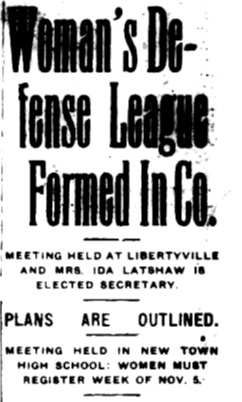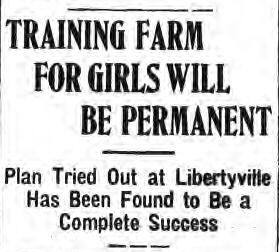This past November, LHS senior Anna Burns delivered a presentation regarding Libertyville during WWI as part of the Libertyville-Mundelein Historical Society’s History Matters series. Anna spent numerous volunteer hours over the last year scanning through the local paper on microfilm looking for articles giving a glimpse at what life was like here in Libertyville and Lake County while our boys were serving over there.
Here are the highlights of Anna’s presentation.
When the United States entered World War I in April of 1917, the citizens of Libertyville in no way anticipated a shift in their day-to-day lives. The town slipped quietly into the war, with no grand headline in the Libertyville Independent announcing the coming of a great and terrible conflict, and no premonition of the changes which were to come. These changes would bring on an onslaught of fear, as suddenly a relatively safe world transformed into an ominous place where sons, husbands, and brothers could be taken away by the United States government to do a duty where death seemed all too often the result; a place where it was uncertain whether there would be enough hard coal in the county to heat homes for the winter; a place where neighbors and friends suddenly turned into “alien enemies”, or even worse, German “spies”.
There was no light at the end of the tunnel, no telling when the war would end. In fact, in August of 1917, only four months after entering the war, Samuel Insull of Libertyville (who held the position of Chairman of the Illinois State Council of Defense) predicted three to five more years of war. Of course, we now know that the United States was in the Great War for less than two years… but at the time, it seemed as though the war would continue to rage for the foreseeable future.

With the announcement of a mandatory draft just three months later in July of 1917, it quickly became clear that the war was no longer “over there”, but had now come much closer to home. In the first round of the draft, Lake County was required to meet a quota of 632 men. When the first draft notices went out, 67 men from Libertyville made the list and were required to report to the draft board’s offices above the Triggs & Taylor store for examination. The Libertyville-Mundelein Historical Society has so far identified over 100 Libertyville men that served during the war.
Libertyville residents at home also served their country with pride and gusto. Those who were exempted from service joined the Home Guard. The State of Illinois established these units for local defense after the Illinois National Guard was called into Federal service. Members were provided with arms and ammunition, but had to provide their own uniforms and drill halls. Libertyville residents were part of Company B of the 6th Regiment Illinois Reserve Militia.

Others participated in the local Red Cross which became a model for the rest of the branches in the state, providing leadership for other branches in the Lake County Red Cross, and reaching a membership of 864 within a few months of formation. During one memorable fundraising activity in May 1918, the Home Guard and Red Cross members collaborated to erect a “toll-gate” across Milwaukee Avenue to stop motorists and solicit donations. According to memories shared at a 1958 reunion of Home Guard members: “When one uncharitable motorist attempted to escape by driving around the barrier, Cpl. Raymond Bristow stubbornly took a hitch around a telephone pole with the rope holding the toll bar down and leveled the windshield of the open touring car7.”

In addition to their Red Cross efforts, women stepped up to serve in other ways. A branch of the Women’s Defense League was formed in Lake County, holding its first meeting at the newly opened Libertyville Township High School. Every woman in the county was asked to register so that a survey of each woman’s abilities and her willingness to serve the cause was known. Just north of Libertyville was also the home of a training farm for the Woman’s Land Army, an initiative to provide women with farming skills in order to to fill in for the men who had gone off to war.
 |
 |
To fund the war, taxes were added to stamps, movie tickets, and railroad tickets and the income tax rate was increased significantly. In spite of this, patriotic Libertyville residents subscribed to Liberty Loans and purchased war savings stamps from the United States Government, with a village population of about 2500 raising $2500 through stamps alone by February 1918.

Along with mobilization for war came “doing without”. The U.S. Food Administration, lead by future president Herbert Hoover, encouraged one wheatless, one meatless, and one porkless day as well as a reduction in sugar use. Warnings against the evils of hoarding were issued so that food stuffs could be used to send to soldiers on the front and our Allies who were suffering shortages. In Waukegan, grocers were not allowed to sell any wheat flour unless the consumer purchased an equal amount of other kinds of cereal and consumers were encouraged to make or buy breads, dubbed Liberty Bread, made of other flours.
Then came a shortage of coal. In Libertyville, the high school was shut down for a week when it exhausted its coal supply and residents were encouraged to burn more wood. Waukegan implemented Heatless Mondays, days when businesses shut down and people conserved energy in whichever way they could. Despite threats of not being able to make it through the winter with sufficient heat, Lake County prevailed, making a strong effort to conserve coal which resulted in an end to the crisis.
In addition to all the day to day worries, there was fear of the presence of alien enemies and any sign of German support. By presidential proclamation, all male German natives fourteen years of age and above were required to register at a local post office or face imprisonment. Nine Libertyville residents registered. German agents were accused of a attacking a residence in Waukegan (actually a furnace explosion) and poisoning a herd of cows in Lake Bluff. School administrators reviewed textbooks for any perceived pro-German passages and the number of high school students enrolled in German language classes declined.
To make things worse, the Spanish Influenza epidemic hit northern Illinois in September 1918 with the Great Lakes Naval Base as the epicenter. On September 23, according to the Chicago Tribune, “4,500 cases of Spanish Influenza” and “more than 100 deaths since Sept. 9” had been reported by Capt. William A. Moffett at the Naval base.27 On October 2, the village board decided to close all schools, churches, and theaters in Libertyville until further notice to try and contain the spread of the disease. The schools and churches were reopened two weeks later and the theater reopened November 2. The number of cases had declined by early November and the crisis had passed.
Just as the epidemic was winding down, so was the war. Libertyville residents celebrated with an “impromptu jubilee” capped by a parade around town with a good portion of the town participating including the Home Guard, the Libertyville band, the “farmerettes” from the Woman’s Land Army farm, and the fire department. There was joy in Libertyville and just a little hope that the the struggles and sacrifices were over.

 |
 |
You can scan through the newspapers as Anna in on microfilm at the library or online at http://vitacollections.ca/cmpldnewsindex/. Libertyville newspapers from 1894-1922 are available.
Sources:
- “Insull predicts three-year war; it may run five.” Libertyville Independent 13 September 1917, Section 2, p.2.
- “Draft Quota in Lake Co. Unfair.” Libertyville Independent 26 July 1917, p.1.
- “Local Draft Board Sends First Notices.” Libertyville Independent 2 August 1917, p.1.
- “Information from the Final Report of the State Council of Defence [sic] of Illinois.” Typed manuscript on file at the Libertyville-Mundelein Historical Society.
- “Lake County Chapter of Red Cross Doing Great Work.” Libertyville Independent 17 Jan 1918, p. 1
- “Toll-gate stopped autoists as they hit town.” Libertyville Independent 30 May 1918, p. 1.
- Report on October 27, 1958 Home Guard reunion organized by the Libertyville-Mundelein Historical Society. Typed manuscript on file at the Libertyville-Mundelein Historical Society.
- “Woman’s Defense League Formed in Co.” Libertyville Independent 18 October 1917, Section 2, p.1.
- Schoenfield, Sonia. “Woman’s Land Army of America…in Libertyville” The Past is Present blog, Cook Memorial Public Library District, January 13, 2017. Accessed December 28, 2017.
- “Liberty Farms training women for land Army.” Libertyville Independent 30 May 1918, p. 1
- “Take One-Cent Stamps as War Tax at Theaters.” Libertyville Independent 8 November 1917, p.1.
- “All Kinds of Railroad Tickets Are To Cost More.” Libertyville Independent 1 November 1917, p.1.
- “The three cent stamps are here; ready for sale.” Libertyville Independent 1 November 1917, p.1.
- “Libertyville Is Second in W.S.” Libertyville Independent 14 February 1918, p. 1.
- “War Economy in Food – a Series of Articles issued by the U.S. Food Administration.” Libertyville Independent 14 January 1918, p.4.
- “Sale of Wheat Flour Here Has Been Restricted.” Libertyville Independent 14 February 1918, p.1.
- “City Observes Its Second Heatless Monday.” Libertyville Indepenent 31 January 1918, p. 2.
- “Burn Wood; It Is Village’s Only Salvation.” Libertyville Independent 7 February 1918, p. 4.
- “High School Closed.” Libertyville Independent 7 February 1918, p. 4.
- “Mrs. S. Durand Charges Germans Poisoned Cattle.” Libertyville Independent 13 September 1917, p.6.
- “Thought German raiders were attacking residence as furnace explodes..” Libertyville Independent 24 January 1918, p. 3.
- “Male German Alien Enemies Must Register.” Libertyville Independent 24 January 1918, p. 1.
- “We Have Nine Alien Enemies.” Libertyville Independent 14 February 1918 p.1.
- “Nothing Found to Delete From the School Books.” Libertyville Independent 6 September 1917, p. 2.
- “Strafing of German Not Needed; None in Grades: Dropping Off of Pupils in High School German Classes Is Due to Many Things.” Libertyville Independent 30 August 1917, Section 2, p. 2.
- “Great Lakes Die of Influenza.” Chicago Daily Tribune 23 Sept. 1918, p. 1.
- “The Influenza.” Libertyville Independent 3 October 1918, p. 5.
- “Libertyville News.” Libertyville Independent 24 October 1918, p. 5.
- “Libertyville News.” Libertyville Independent 31 October 1918, p. 5
- “Extra: War Ends, Huns Sign.” Libertyville Independent 7 November 1918, Section 2, p.1.
- “End of World’s War Brings Joy to Libertyville.” Libertyville Independent 14 November 1918, p. 1.
Discover more from Cook Memorial Public Library District
Subscribe to get the latest posts sent to your email.
Categories: Local History
Tags: Local History
